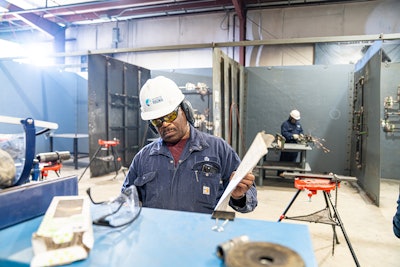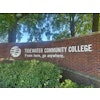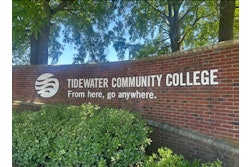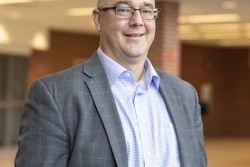PORTSMOUTH, Va. — Inside a cavernous industrial space in Portsmouth, the rhythmic hiss and spark of welding torches fill the air. Twenty-five students work simultaneously in individual booths, learning skills that will transform their economic futures in just three weeks. This is the Skilled Trades Academy, the centerpiece of Tidewater Community College's ambitious workforce development initiative, and a model that's now expanding across Virginia's Hampton Roads region.

For TCC President Dr. Marcia Conston, who arrived in early 2020, that gap-filling mission has become increasingly sophisticated. Under her leadership, the college has expanded its Skilled Trades Academy, launched mobile training labs, and deepened partnerships with industries ranging from shipbuilding to hospitality—all while leveraging Virginia's remarkable state funding programs that make workforce training largely free for students.
Conston came to TCC after nearly 20 years as vice president for Enrollment and Student Success Services at Central Piedmont Community College in Charlotte, North Carolina. Her three-decade career in higher education began at Jackson State University in Mississippi, where she also earned her bachelor's and master's degrees, and a doctorate from the University of Southern Mississippi. As an evaluator for the Southern Association of Colleges and Schools, she had evaluated 14 institutions for reaccreditation, including two Virginia community colleges, before taking the helm at TCC.
Meeting Industry Where It Lives
 Dr. Marcia ConstonTidewater Community College
Dr. Marcia ConstonTidewater Community College
"One of the biggest differences between Texas and Virginia is the amount of funding that's available for workforce students is just astronomical," Hall observes. "Back home, most students had to pay most of their tuition out of pocket. Here, pretty much a student can get a certificate or a license for free."
Funding comes from a number of sources including the regional workforce board, the Hampton Roads Workforce Council, and industry leaders who support scholars that fund students directly into the jobs they need to fill. Virginia’s Fast Forward funds remain the primary source and cover workforce training costs through a unique incentive structure. Students technically pay the first third of costs, though grants often cover this. The state then reimburses colleges for the second third when students complete their training, and the final third when students pass their certification exams.
Additional programs like G3 (Get a Skill, Get a Job, Get Ahead) provide last-dollar funding for credit programs, creating stackable credential pathways from short-term certificates to associate degrees.
The result is transformative access. At the Skilled Trades Academy, which opened in 2018 and dramatically expanded after Conston's arrival in 2020, students graduate paying no more than 10% of their total education costs.
"When they go to work and start making money, that money goes in their pocket and changes their lives," explains Laura Hanson, associate vice president of corporate solutions at TCC. She has been instrumental in developing the Portsmouth location and leading TCC's workforce organization.
Speed and Flexibility as Core Values
Unlike traditional academic programs constrained by semester schedules and accreditation requirements, TCC's workforce programs operate with remarkable agility. The welding program runs 120 hours over three weeks—from 7 a.m. to 3:30 p.m., with evening classes from 4:30 to 10 p.m. Students emerge with immediately marketable skills.
"Three weeks from the day they start, they've got a skill that's going to make them employable," Hanson notes. The facility currently runs all 30 welding booths at capacity during day sessions, with another 30 students in evening classes pursuing advanced certifications after landing jobs.
When TCC first moved into the Portsmouth facility, there was no welding infrastructure. Through aggressive pursuit of state, federal, and local grants, the college installed 10 booths initially. Demand required 10 more almost immediately, and another five were added within the past year. Hanson anticipates continued expansion over the next several years as demand shows no signs of slowing.
But the flexibility extends far beyond scheduling and capacity. When one employer could only train workers between 10 p.m. and 3 a.m., TCC made it happen. When Norfolk Naval Shipyard requested $240,000 in annual customized training, TCC designed programs to meet those specific needs. When TST Corporation needed welders, TCC parked a mobile welding lab in their parking lot—guaranteeing interviews for every student who passed certification.
“We have four mobile training labs—welding, electrical, healthcare, and culinary,” Hall explains. "These are basically 18-wheeler trucks, and we can take those trucks to a particular location, plant them for any number of months, and train students directly from the business or surrounding community.”
This hyperlocal approach reduces barriers to access while meeting employers' immediate needs. When TCC placed a welding lab in front of Lyon's Shipyard in Norfolk, students literally walked out of training and into jobs. “Every student who went through got a job,” Hall recalls. “They went out of the lab and into the building and went to work. It was just like that.”
Partnership as Strategy
 Portsmouth Mayor Shannon E. GloverTidewater Community College
Portsmouth Mayor Shannon E. GloverTidewater Community College
“I watch all of these young people come out of here, and they got pride now,” the mayor reflects, as he walked the facility with Conston and other TCC leaders in tow. “They believe in their skills, they've learned something, and they have the ability to earn, man. That's what we should be doing 100% of the time.”
The mayor's support extends beyond rhetoric. He works directly with TCC and city economic and workforce development departments to locate mobile labs and identify training needs.
“The mayors of these cities really love the collaboration.” Hall notes. “We work pretty much directly with their economic workforce development departments.”
That public-private partnership extends to facility development. The city collaborated with TCC to secure and develop the 20,000-square-foot Skilled Trades Academy, recently expanded by an additional 12,000 square feet through fundraising—TCC's real estate foundation purchased the building—and partnerships with the City of Portsmouth. A ribbon-cutting for the expansion, featuring new labs for HVAC, plumbing, carpentry, roofing, and high-voltage electrical work took place in September 2024.
Industry partnerships also shape curriculum design. The Virginia Ship Repair Association, representing approximately 300 companies, collaborated with TCC to create the Maritime Trade Training (MTT) certification.
“It was an industry-created certificate used to drive industry needs,” Hall explains. “We use the community college to prepare those students, and then the industry looks toward those students for jobs.”
The new construction trades section of the Skilled Trades Academy similarly responds to direct employer requests. “We've had a couple of companies come in and ask for particular types of certifications that they need for their businesses,” Hall notes.
Partnerships include ongoing discussions with the Port of Virginia to provide customized training for transportation and logistics workers. The Port's needs are so substantial that they want dedicated classroom space in TCC's new expansion, bringing in original equipment manufacturers to train staff on specialized equipment.
Conston has prioritized revitalizing workforce advisory committees to maintain constant feedback loops with industry leaders.
“Tell us what your needs are,” she urges employers. “Tell us how we can fill your pipelines. What are we doing that we shouldn't be doing? How can we do things differently?”
This responsive posture has already led to program additions. When an employer recently asked about high-voltage electrical training, Hanson followed up with other companies. “The word is yes,” she discovered. “So now we're looking at what equipment we need to acquire to be able to do high-voltage training, because if that's a need, then we have to respond to it.”
Measuring What Matters: Outcomes
The proof of TCC's workforce model lies in its outcomes. Students completing programs see wage increases of 150% to 288% within six months. Even the lowest employment rate six months post-completion stands at 68%—and some programs approach 100%.
Perhaps more significantly, 82% of workforce graduates stay in Virginia, directly addressing the state's longtime concern about talent retention.
"Here in Virginia, the majority of our workforce individuals stay in the region," Conston notes. “They're financially contributing back. They get the trade, they go to work.”
This stability contrasts sharply with traditional four-year graduates who often leave for larger metropolitan areas.
This retention makes the return on investment case for workforce development politically unassailable. "Whether you're going to earn a degree in English or study welding, the bottom line is that we all want a job," Conston reflects. "With workforce, this is where we can really demonstrate the return on investment. We were easily able to provide that data because people would get jobs, and we could demonstrate how much money they were making and how many were actually getting jobs."
The bipartisan appeal matters in an era when higher education faces increased scrutiny. "There's always this discussion about return on investment," Conston notes. "But the workforce piece is something that's not as political, right? We can get Republicans and Democrats behind it because it's about work."
Expanding the Model and Regional Cooperation
Building on the Portsmouth success, TCC is replicating the model across the region. The college recently secured funding to expand at its Virginia Beach campus and is exploring additional sites in Norfolk. The CARENOW project, launched in partnership with Norfolk Works, exemplifies this community-embedded approach—a mobile healthcare lab stationed at the Jordan-Newby Anchor Branch Library brings training directly into neighborhoods.
TCC is also expanding its current credit-based apprenticeship programming to include a workforce-based model. Building upon a strong history as a provider of related technical instruction to companies, TCC is poised to become the first community college sponsor in the state of Virginia of a registered apprenticeship program (RAP). Its partner is Fairlead Integrated, a prominent ship repair company in Hampton Roads. Apprenticeships are the future of skills-based workforce training, and TCC aims to be both a state and national leader.
TCC's expansion also reflects lessons learned about instructor recruitment and quality. On the credit side, instructors must meet stringent accreditation requirements for credentials. "On the non-credit workforce side, we have a lot more flexibility," Hall explains. "We want quality instruction, so we want our instructors to come from industry. They don't necessarily need to have the bachelor's degree or the master's degree. They need to have the experience."
This flexibility allows TCC to tap practicing welders, electricians, and other skilled tradespeople as instructors, ensuring students learn current industry practices rather than outdated textbook approaches.
The success of TCC's model has also informed regional collaboration. In 2021, TCC joined with Paul D. Camp and Virginia Peninsula community colleges to form the Community College Workforce Cooperative (CCWC). The cooperative creates a single point of contact to access workforce training resources across the three colleges, which together serve 11 cities and four counties through 10 locations.
"In my first year as college president, I quickly learned how limiting the artificial boundaries of our college service regions can be to the work we do," Conston said when the cooperative launched. "This is an important step for us to take to ensure that boundaries that were mapped out in the 1960s don't stop us from addressing Hampton Roads' many training needs."
The CCWC directs and coordinates job training resources, leveraging facilities, labs, and additional training resources across all three community colleges to address sizeable needs in industries like shipbuilding and ship repair. The centralized coordination means those needs can be addressed faster and more cost-effectively, while also positioning the region to respond to emerging trends like the growing alternative energy industry.
A National Model
As workforce development becomes increasingly central to community college missions nationwide, TCC's Hampton Roads model offers replicable lessons: leverage state funding to eliminate financial barriers; prioritize speed and flexibility over traditional structures; embed training in communities and workplaces through mobile labs; maintain constant industry engagement through advisory committees; measure success through employment and wage outcomes; and build regional cooperation to transcend artificial service boundaries.
The model also demonstrates the power of presidential leadership. Conston's arrival at TCC marked an inflection point. She brought her decades of experience in enrollment management and student success to bear on workforce development.
"When Dr. Conston came in, it's when we kicked it up to the next level," Hanson recalls. "We were not running all of these programs here at that time. We were just figuring it out. But the deep dive where we said, 'Nope, we're going to put everything here, we're going to grow it all'—that happened when Dr. Conston arrived."
For the students walking out of three-week welding programs into jobs paying $50,000 and up, the academic debates about community college missions matter less than the immediate transformation of their economic prospects. In Hampton Roads, TCC and its partners have demonstrated that when community colleges truly function as "access gap fillers"—meeting students where they are, training them for jobs that exist now, and partnering deeply with industry and local government—the results change not just individual lives but entire regional economies.
As one Portsmouth resident who enrolled in workforce training reflected, TCC made education accessible when traditional pathways seemed out of reach. And for the mayor watching graduates walk out with new skills and pride, the impact transcends workforce development statistics.
"They get a future, they get a home, right?" Glover says. "They get all the things that young people need."















